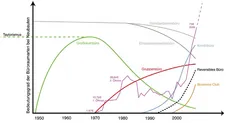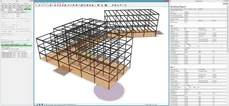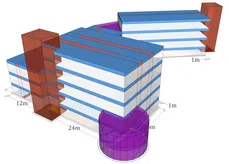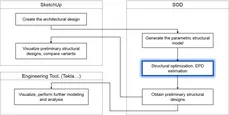Overview
Ongoing research projects:
Completed research projects:
- Project of the Ministry for Regional Development and Housing of the State of Baden-Württemberg (MLW BW) - Reuse of wood and steel construction products
- AIF FOSTA P 978 - Holistic evaluation of steel and composite railway bridges according to sustainability criteria
- AIF Zutech - FOSTA P 843 Holistic evaluation of steel and composite bridges according to sustainability criteria
- AIF Zutech – FOSTA P 881 Sustainable office and administration buildings in steel and composite steel construction
Reuse of wood and steel construction products
- Project of the Ministry for Regional Development and Housing of the State of Baden-Württemberg (MLW BW)
- Project period: 2023 - 2024
- Project partner: Karlsruhe Institute of Technology, Research Center for Steel, Timber and Masonry
Due to the high resource and energy consumption of the building industry, circular construction is indispensable to achieve climate policy goals. In this context, the reuse of circular building products of wood and steel construction offers potential to reduce primary material consumption,
reintroduce secondary material into the material cycle and avoid possible material bottlenecks. In addition to increased recycling rates for wood and steel, controlled deconstruction and reassembly of building elements should therefore also take place in the future. The main difficulties in this process are the evaluation of the components for their reuse potential.
The aim of this research project is to lay the foundations for the reuse of timber and steel construction products after a building has been dismantled. For this purpose, the following aspects are to be investigated in more detail:
- Inventory before deconstruction;
- Measures for deconstruction that is gentle on the building components;
- Analysis of the physical and mechanical properties of components to be reused;
- Processing of the components;
- Proposals for an evaluation procedure of the components according to building law.
Holistic evaluation of steel and composite railway bridges according to sustainability criteria
- AiF-FOSTA-Project FOSTA P 978
- Project period:
- Partners: University of Stuttgart, Institute for Construction and Design; University of Stuttgart, Chair of Building Physics; Karlsruhe Institute of Technology, Research Institute for Steel, Wood and Stone, and many industrial stakeholders
An important aspect in the durability of a tied arch bridge is the fatigue safety of its hangers which essentially depends on the design of connection details. To optimize these critical points different connection types were investigated, concepts for the dynamic determination of stress vibration widths from traffic were determined by taking eccentricities and connection stiffnesses into account, and geometries with low stress peaks were sought using FE models. With the help of weld seam simulation the connections were optimized to minimize unfavourable residual stresses and to keep low notch effects from manufacturing for achieving more favorable fatigue behaviour. The investigations were part of an interdisciplinary research project on the sustainability assessment of railroad bridges. In addition to the above mentioned functional quality, ecological, economic, and social aspects were considered with the aim to create a holistic evaluation system.
Responsibility
Marjolaine Pfaffinger
Holistic evaluation of steel and composite bridges according to sustainability criteria
- AiF-ZUTECH research project
- Project period: 2010 - 2013
- Cooperation with the University of Stuttgart, Karlsruhe Institute of Technology, Federal Highway Research Institute, and various partners from industry

Current situation
Until today, the objective of building a completely new bridge was mostly to minimize new construction costs. However, for a holistic approach, far more aspects need to be considered. Besides, economic factors (construction costs, maintenance costs, repair costs, ...) along with ecological factors (greenhouse potential, raw material consumption, ...) and functional aspects (risk of congestion, ...) are essentially important.
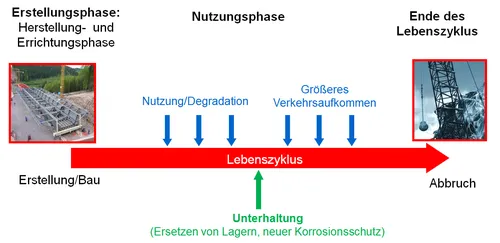
Objective
A design basis was created that allowed a holistic assessment of steel and composite bridges by underpinning the three aspects of ecological quality (LCA), economic quality (LCC) and functional quality, with specific criteria of concrete bridge construction. The innovative characteristic of this project was that the various quality requirements were combined into a single overarching quality concept of sustainability. Thus, in future, an objective evaluation of bridge structures that is generally recognized as such will be possible based on sustainability criteria.
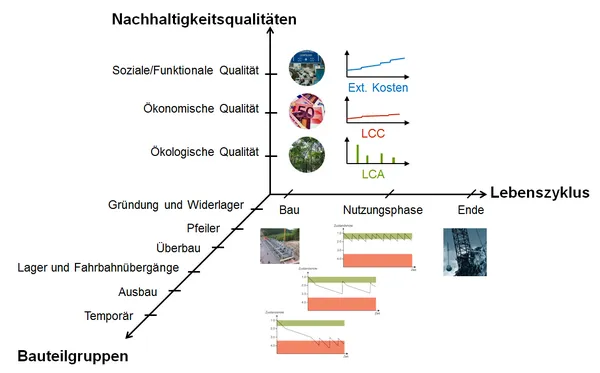
Sustainable office and administration buildings in steel and composite steel construction
Sustainable Office Designer (SOD) Download →
- AiF-Zutech - project FOSTA P 881 (part of the NASTA research cluster on sustainability in steel construction).
- Project period: 2009-2012
- Project partners: Technical University of Dresden, Institute of Steel and Timber Construction; RWTH Aachen - Chair of Steel and Light Metal Construction, Technical University of Darmstadt, Department of Design and Building Construction; Institut für Technologie und Arbeit e.V., Kaiserslautern; Technical University of Kaiserslautern, Chair of Corporate Accounting and Controlling, and a large number of industry partners.
- Book publication: Office buildings in steel
As part of the AIF-Zutech project P 881, sustainable office and administration buildings in steel and composite steel construction, an interdisciplinary research team developed planning tools and methods for the design and evaluation of these buildings. In addition to ecological and economic criterias, architectural, socio-cultural and socio-technological criteria were also taken into account. The benefits of flexibility and their evaluation were of a particular focus, as this has important consequences on building design and subsequent marketability of these buildings. Based on the various forms of usages, developments, and trends in the structural organization of office buildings, the socio-technological and socio-cultural requirements were formulated. Strategies for life-cycle-oriented economic evaluations were developed including value-added accounting. Among construction-related topics was the development of sustainable load-bearing structures in steel and composite steel construction. Chair of Metal Construction at TUM led the project and developed the intuitive CAD-based software for ecological optimization of load-bearing office buildings steel structure using genetic algorithms which enabled in setting up a proper direction at an early design phase with respect to a particular ecological building design. The Sustainable Office Designer is available today free of charge as a SketchUp plugin in the Extension Warehouse of the SketchUp CAD environment.
The project results were summarized in a research report, which is available from FOSTA. Additionally, the project results were made available to the public in the form of a book called "Steel Office Buildings".
